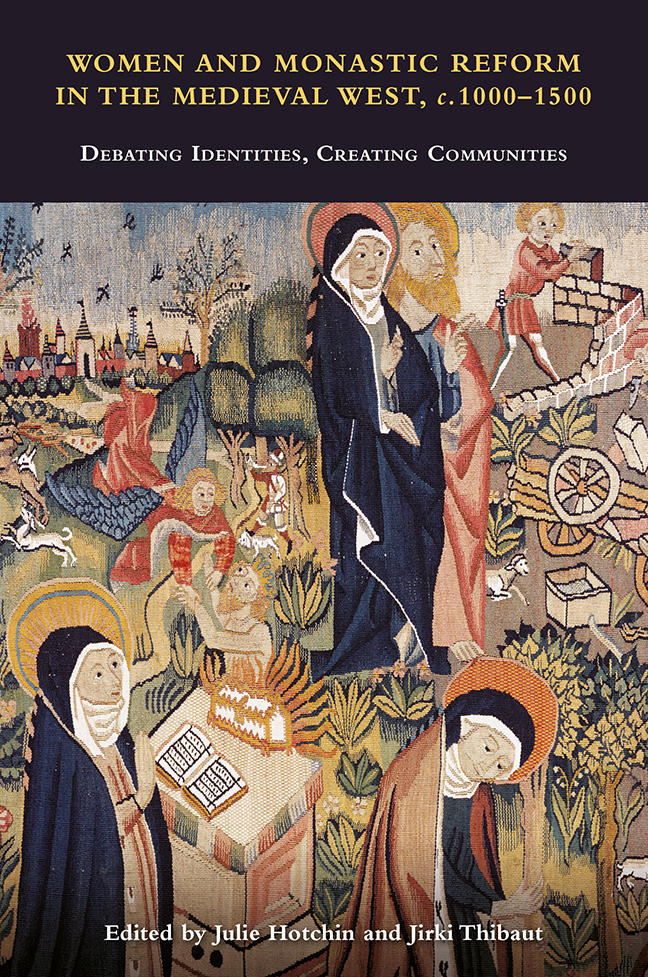 Women and Monastic Reform in the Medieval West, c.1000-1500
Women and Monastic Reform in the Medieval West, c.1000-1500 Book contents
- Frontmatter
- Dedication
- Contents
- List of Illustrations
- List of Contributors
- Acknowledgements
- List of Abbreviations
- 1 Debating Identities: Women and Monastic Reform in the Medieval West, c. 1000–1500
- 2 Liturgy and Female Monastic Hagiography Around the Year 1000: A lecture croisée of the Life of Liutrud, the Second Life of Glodesind of Metz and the So-called Pontificale Romano-Germanicum
- 3 Remakers of Reform: The Women Religious of Leominster and their Prayerbook
- 4 The Materiality of Female Religious Reform in Twelfth-Century Ireland: The Case of Co-located Religious Houses
- 5 Women as Witnesses: Picturing Gender and Spiritual Identity in a Twelfth-Century Embroidered Fragment from Northern Germany
- 6 Mulieres religiose and Cistercian Nuns in Northern Italy in the Thirteenth Century: A Choice of ‘Order’
- 7 Circulation of Books and Reform Ideas between Female Monasteries in Medieval Castile: From Twelfth-Century Cistercians to the Observant Reform
- 8 Women, Men and Local Monasticism in Late Medieval Bologna
- 9 Building Community: Material Concerns in the Fifteenth-Century Monastic Reform
- 10 Who Made Reform Visible? Male and Female Agency in Changing Visual Culture
- 11 Nuns, Cistercian Chant and Observant Reform in the Southern Low Countries
- Index
- Other volumes in Studies in the History of Medieval Religion
1 - Debating Identities: Women and Monastic Reform in the Medieval West, c. 1000–1500
Published online by Cambridge University Press: 09 January 2024
- Frontmatter
- Dedication
- Contents
- List of Illustrations
- List of Contributors
- Acknowledgements
- List of Abbreviations
- 1 Debating Identities: Women and Monastic Reform in the Medieval West, c. 1000–1500
- 2 Liturgy and Female Monastic Hagiography Around the Year 1000: A lecture croisée of the Life of Liutrud, the Second Life of Glodesind of Metz and the So-called Pontificale Romano-Germanicum
- 3 Remakers of Reform: The Women Religious of Leominster and their Prayerbook
- 4 The Materiality of Female Religious Reform in Twelfth-Century Ireland: The Case of Co-located Religious Houses
- 5 Women as Witnesses: Picturing Gender and Spiritual Identity in a Twelfth-Century Embroidered Fragment from Northern Germany
- 6 Mulieres religiose and Cistercian Nuns in Northern Italy in the Thirteenth Century: A Choice of ‘Order’
- 7 Circulation of Books and Reform Ideas between Female Monasteries in Medieval Castile: From Twelfth-Century Cistercians to the Observant Reform
- 8 Women, Men and Local Monasticism in Late Medieval Bologna
- 9 Building Community: Material Concerns in the Fifteenth-Century Monastic Reform
- 10 Who Made Reform Visible? Male and Female Agency in Changing Visual Culture
- 11 Nuns, Cistercian Chant and Observant Reform in the Southern Low Countries
- Index
- Other volumes in Studies in the History of Medieval Religion
Summary
Around the turn of the tenth century, a sister from Hohenbourg in Alsace composed a Life of the community's holy founder, St Odile (died c. 720). Odile is depicted as a charismatic leader with persuasive speech. One scene recounts how, when the newly formed community gathered to determine the manner of religious observance to guide their lives, Odile asked the sisters ‘whether they wished to live the canonical or regular life’. Although this choice did not exist at the time of the events described, the Life nevertheless records that the women unanimously opted for the regular life as an expression of their piety. St Odile is said to have cautioned her sisters against adopting the constraints this would entail. Acknowledging their desire to ‘bear every difficulty and harshness for the name of Christ’, she warned them against this course as ‘our successors would curse us’ because their location, at the top of the Hohenbourg, made it difficult to obtain water ‘without great effort’. Persuaded by her practical argument, the sisters yielded and elected to retain the ‘canonical dress’.
Odile's dialogue with the sisters at Hohenbourg offers a tantalizing glimpse into community dynamics and wider social and religious expectations about the role and function of female religious institutions. In representing women debating what form of religious observance the nascent community would adopt, the Life is representative of a wider culture of debate about the institutional and spiritual identity of monastic women. In presenting the adoption of the canonical life as a pragmatic decision influenced by the logistics of the location, the author of the Life may have intended to justify the canonical life to counter efforts to introduce the Benedictine Rule to the community at Hohenbourg. If so, this anecdote shows how contemporary pressures facing the author shaped the narrative of St Odile and the community's origins, lending authority to the present community who drew on their founder's legacy to legitimise their way of life. But the sisters’ decision in favour of a particular observance also needs to be seen as an expression of political agency. Odile's argument to maintain autonomy, expressed through the rationale of being able to freely obtain water outside the cloister, projected the practical realities of the contemporary community upon its first members. Odile’s argument hence created an authoritative tradition upon which they could draw to legitimise their own practice in contemporary debates.
- Type
- Chapter
- Information
- Women and Monastic Reform in the Medieval West, c.1000-1500Debating Identities, Creating Communities, pp. 1 - 23Publisher: Boydell & BrewerPrint publication year: 2023
